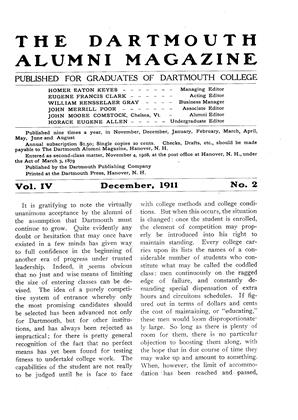Under the present chinning agreement, fratenities play a larger part in the affairs of Dartmouth during three Weeks in October than all the rest of the year together. Each evening from the beginning of organized calling, in the middle of that month, until the first of November, the campus swarms with groups of men who cross arid recross to the various dormitories in quest of "material" for their freshman delegations.
A much larger number of freshmen accepted bids early in the morning of chinning day this year than last. In all, 204, or 48% of the 426 men in the class, were pledged before the day ended. This percentage is about equal to that of the other classes now in College at the beginning of their freshman year; but lower than that of the College because of the number who join fraternities later in their course.
Of the whole number of undergraduates 59% are fraternity men. The proportion of fraternity men in the upper classes stands as follows: Seniors 70%, juniors 75%, sophomores 57%.
The chinning season is a very elastic term of Dartmouth. At one time it meant February. In 1909 chinning day came December 1, last year bids were given the first Monday in October, and the date this year was. a compromise between the two.
Rumors of premature chinning and other infractions of the rules of common agreement, which have each year led to dissatisfaction with the system and demand for a change, were prevalent this fall as usual. Enforcement of these rules is assigned to the Interfraternity Council, made up of one representative from each fraternity; but action is seldom taken. The only available penalty is publicity.
Two years ago the council drew up resolutions censuring a fraternity for entertaining freshmen at its quarters before pledge day. The censure was later withdrawn on the ground that "practically every fraternity was guilty of a violation of the rules." Since then no more such resolutions have appeared until this year. On evidence brought out by an examination of witnesses the Interfraternity Council recently published in The Dartmouth a severe censure of another chapter; and although the College generally considers that there were many ether- offenders, the resolutions have not been reconsidered.
 View Full Issue
View Full Issue
More From This Issue
-
 Article
ArticleTHE RECENT GROWTH OF DARTMOUTH A PARTIAL RECOVERY OF POSITION
December 1911 By William Jewett Tucker, '61 -
 Article
ArticleIt is gratifying to note the virtually
December 1911 -
 Article
ArticleREMINISCENCES OF PROFESSOR SHURTLEFF
December 1911 By Josiah Whitney Barstow, '46 -
 Article
ArticleFOOTBALL
December 1911 -
 Class Notes
Class NotesCLASS OF 1907
December 1911 By Thacher W. Worthen -
 Class Notes
Class NotesLOCAL ASSOCIATIONS
December 1911
Article
-
 Article
ArticleWork Started on Orozco Book
MAY 1966 -
 Article
ArticleOff-Campus Study
MARCH 1983 -
 Article
ArticleStephen M. Mullins '54 President, Alumni Council
APRIL 1988 -
 Article
ArticleDr. Wheelock's Journal
December 1994 By E. Wheelock -
 Article
ArticleTimothy Edgar ’94
MAY | JUNE By LISA FURLONG -
 Article
ArticleLOOK OUT FOR THE SWINDLER
April 1931 By S. Prentiss Baldwin '92


